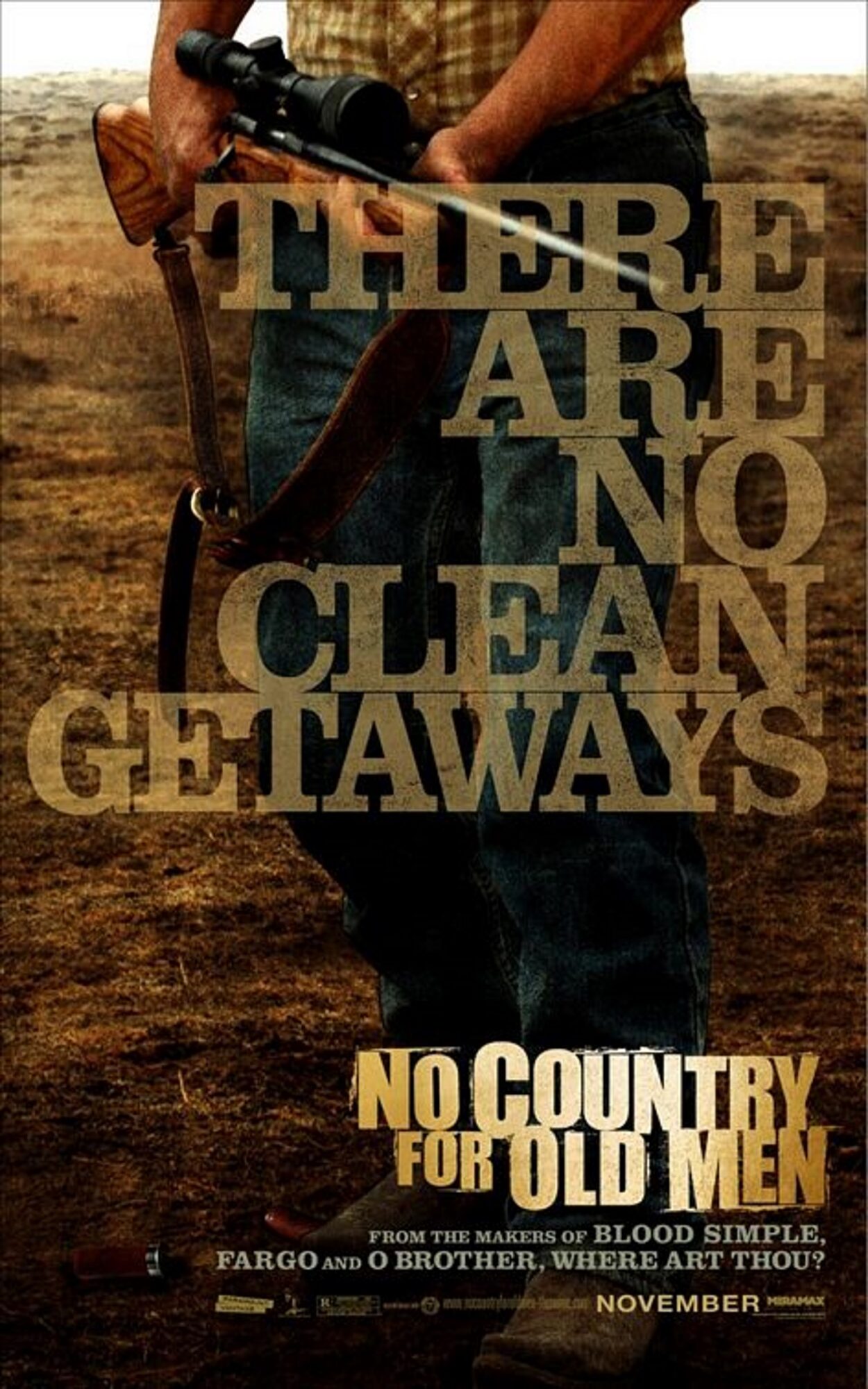No Country For Old Men is a 2007 Coen Brothers film which hews pretty closely to Cormac McCarthy’s 2005 novel of the same name. This is a transcendent example of a crime story, with a pessimistic view on the greed of humans, and on the nihilistic worldview police officers can fall into after a lifetime of crime fighting. In conservative crime stories the baddies get their comeuppance. In reality, bad people don’t always get what’s coming to them.
Business Insider ranked the Coen Brothers’ movies from 1 to 17 and No Country For Old Men comes in at number three. (Did you know the Coens had written quite this many movies? I didn’t.)
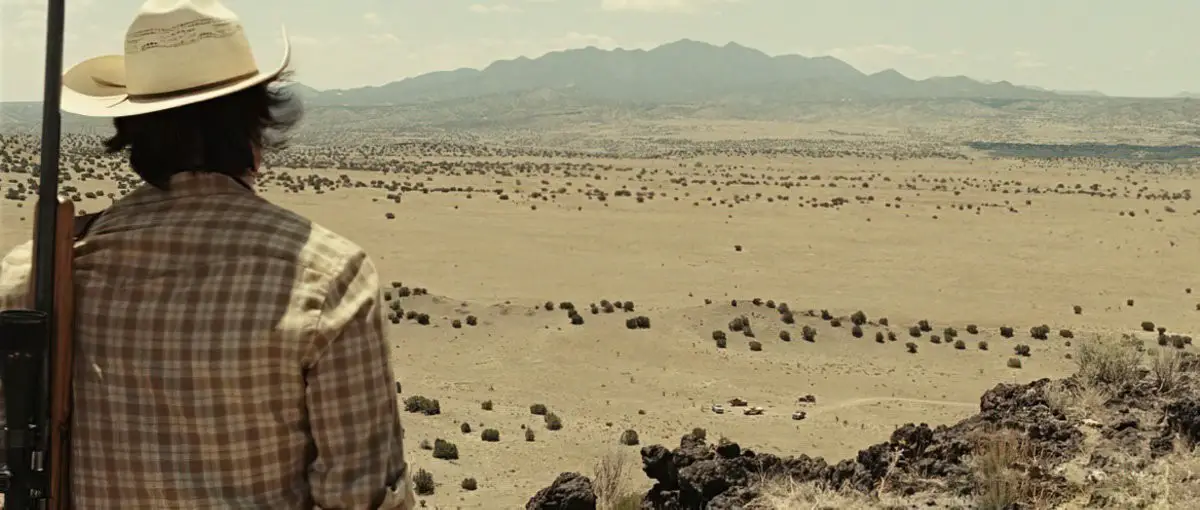
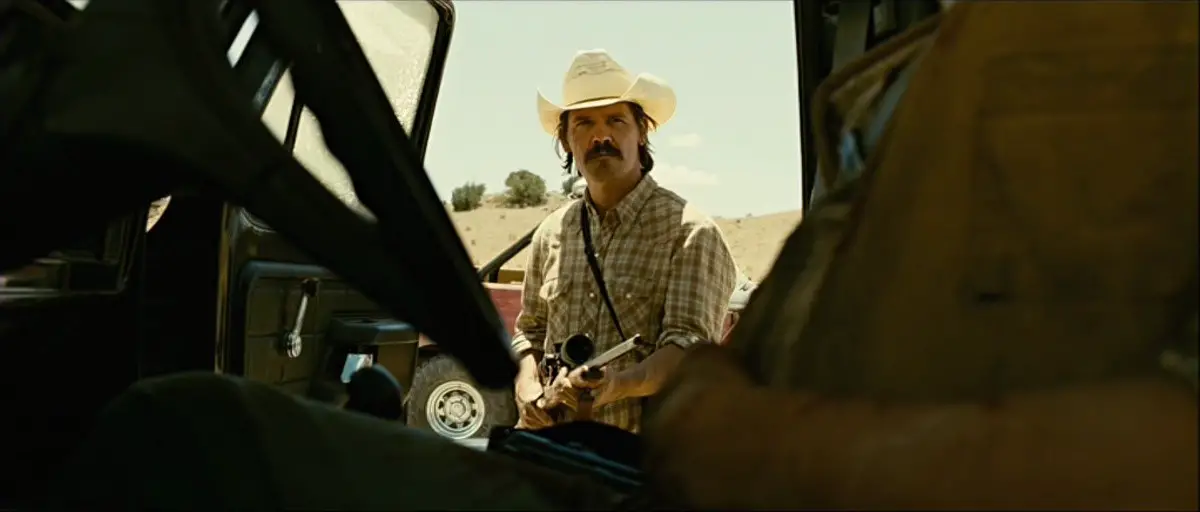
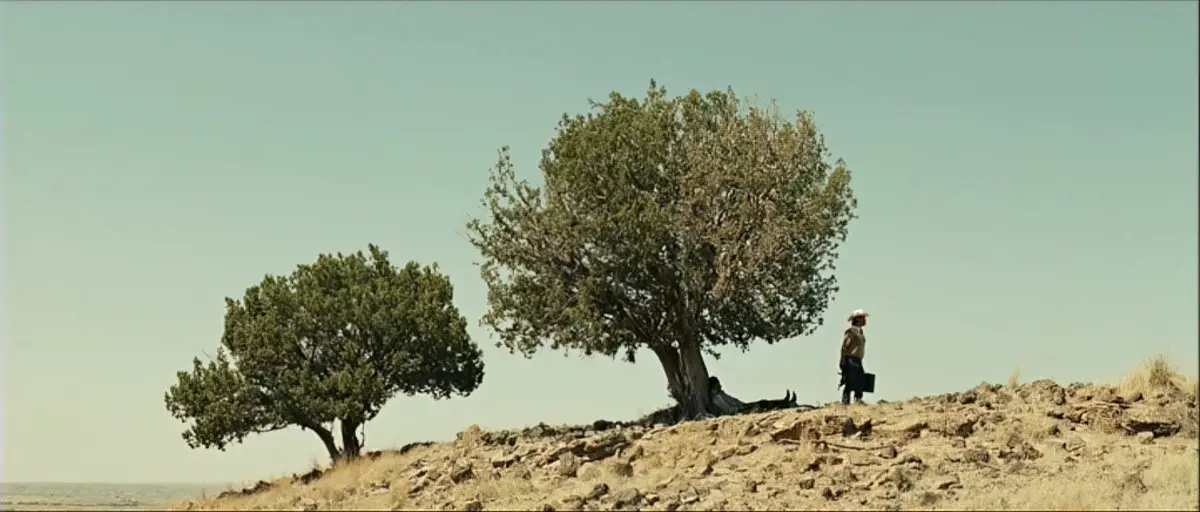
HUMOUR AND IRONY
It is said in that same article that No Country For Old Men is without irony:
Many say “No Country for Old Men” is objectively the best film the Coen brothers ever made. They have a point. “No Country” earned them their first Oscars for best director and best picture. The awards were well-deserved. At first, this doesn’t feel like any Coen brothers film ever made. It is dead serious and unironic. The lively soundtrack has been replaced with dead silence, creating an absolutely brilliant sense of dread.
But is that really true? I go by the idea that all stories are inherently ironic. To use Matt Bird’s definition of irony, in every story there’s a gap between story outcome and audience expectation. It’s certainly true that this Coen Brothers movie is significantly different in tone. But there is indeed irony:
- There is dramatic irony running throughout the entire plot. The audience knows exactly what Chigurh is up to because we’re there with him on his serial killing rampage before Llewellyn even discovers the box of cash. So the audience is in constant audience superior position. This is necessary in the creation of suspense, because we know just what’s at stake and we must watch Llewellyn come to that same, slow realisation for himself.
- Even at a line level, I can see exactly how the novel No Country For Old Men would have appealed to the dark humour of the Coen Brothers. When Llewellyn arrives home with a satchel full of cash his wife asks him what’s inside. Llewellyn tells her it’s full of cash. “Yeah, that’ll be the day,” she scoffs, obviously used to her husband’s ironic sense of humour. Again we have dramatic irony — this is funny to the audience because we know that this time Llewellyn is telling the truth. Though we haven’t seen Lewellyn’s entire backstory we just know he’s got a history of ironic comebacks. We know this from Carla Jean’s response. “That’s just like Llewellyn,” we think to ourselves, along with his wife.
- The name Chigurh was coined by McCarthy because he didn’t want Anton to be of any nationality in particular. But it’s also ironically funny, sounding very much like Sugar.
- Both Lewellyn and Chigurh wear white socks — ironically symbolic, since white is heavily associated with purity and innocence. Carson Wells wears a white hat. In this film Carson Wells is indeed set up as the good guy from your unironic Western film, yet take away all the other evil and Carson Wells himself is a pretty terrible individual. The point of this irony? Evil is all relative. A bad person can be the good person depending on the story. Another crime show, this time British, gives us the full spectrum of evil men: Happy Valley.
Nor is this story without humour. It is the dark humour which makes this film watchable.
A lot of the humour derives from the juxtaposition between out-and-out evil walking around on a murdering spree in an environment where the ‘regular’ counterparts of friendly, guileless, open, helpful and ultimately confused when confronted with imminent death. This should not really be funny, but because it happens again and again, with Anton meeting basically the same characters in different bodies, it becomes almost ridiculous, and therefore, is. The predictability makes it so. A lot of gags in No Country For Old Men rely on the audience already knowing what’s going to happen. Any sort of comedic character relies on that, actually. We know Catherine Tate’s Nan character is going to turn sour as soon as a visitor leaves the room. We know that at some point in every episode of Kath and Kim, Kath will say, “Look at me, look at me Kimmy,” and we know that Magda Szubanski’s character Lynne is going to say, “I said pet, I said love…” and take a long draw on her cigarette.
So when Anton Chigurh grimly carries out his plans, sighing at the same responses, “You don’t have to do this,” or “I don’t understand”, I guess we can either laugh or cry. And I don’t believe the point is to make the audience cry over the murders of Anton’s victims. The point is for us to be further and further intrigued and baffled by his mindset.
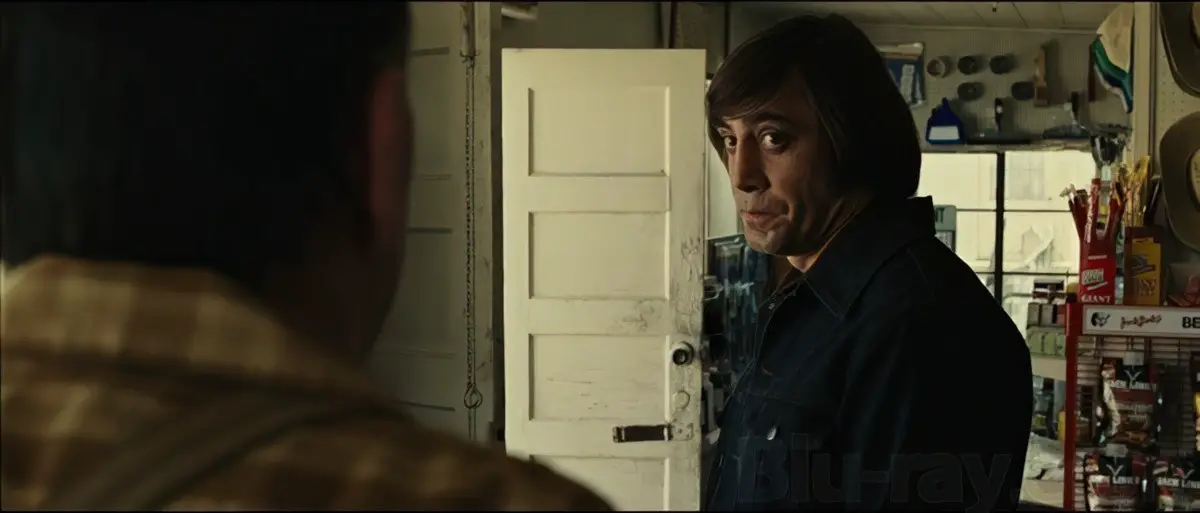
This juxtaposition between Everyday People and Anton Chigurh hangs on expression of detail.
James Wood writes of the influence of Flaubert on modern crime writing (as well as on war reportage):
Flaubert manages to suggest that…details are somehow at once important and unimportant: important because they have been noticed by him and put down on paper, and unimportant because they are all jumbled together, seen as if out of the corner of the eye; they seem to come at us “like life”. From this flows a great deal of modern storytelling, such as war reportage. The crime writer and war reporter merely increase the extremity of this contrast between important and unimportant detail, converting it into a tension between the awful and the regular: a soldier dies while nearby a little boy goes to school. […] All detail is somewhat numbing, and strikes the traumatised voyeur in the same way.
How Fiction Works
When we see Anton take off both socks and fling them into the bathroom, this focus on detail sits in opposition to the out-and-out recklessness of the shooting spree — here’s a man who has killed three people because he had the wrong room. (Or had the right room and simply didn’t care.) Juxtaposition is one of the eleven elements of comedy, as described by the founder of The Onion.
“CAN YOU VALIDATE MY PARKING”?
Did this one go over your head a bit? It did for me.
The scene when Carson Wells visits the businessman who hires him to find Anton, and Wells asks about getting his parking ticket validated and how the building is missing a floor, is something deeper to this point in the conversation that I completely missed or?
u/mylefthandkilledme on Reddit
Answer from a deleted user:
You know how he knows how dangerous Anton is but still accept the hunting job, for what? Because he spent so much money living a luxurious life, he had to accept the job no matter how dangerous it is? Him asking for parking ticket validation is just supporting this backing story because someone might ask – why on earth would he mess with someone like Anton? For the missing floor, one floor missing means there is a secret floor, what do a businessman dealing drugs need a secret floor for? He mentioned that in a mean of threatening the guy, very lightly. Basically, it’s just trying to show audience what kind of person Carson Wells is. Hope this helps
It helps to know the meaning of ‘validate my parking’. Unless you live in a city, this may not be obvious.
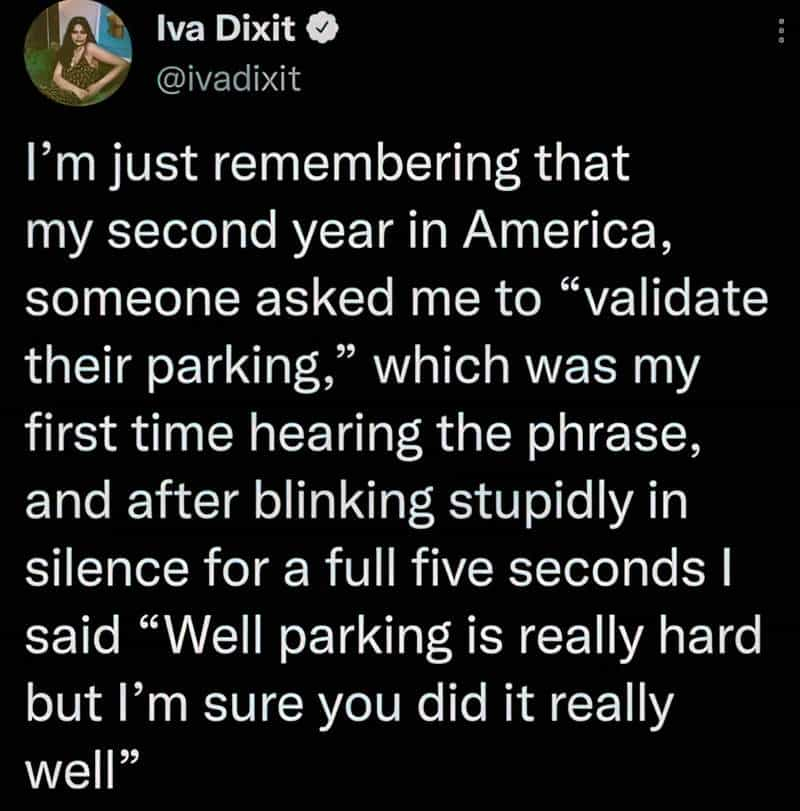
GENRE BLEND OF NO COUNTRY FOR OLD MEN
This is a crime story utilising thriller elements, combined with drama to provide subtle characterisation. The addition of ‘drama’ elevates the story and allows it to resonate with the audience while saying something deeper about human nature.
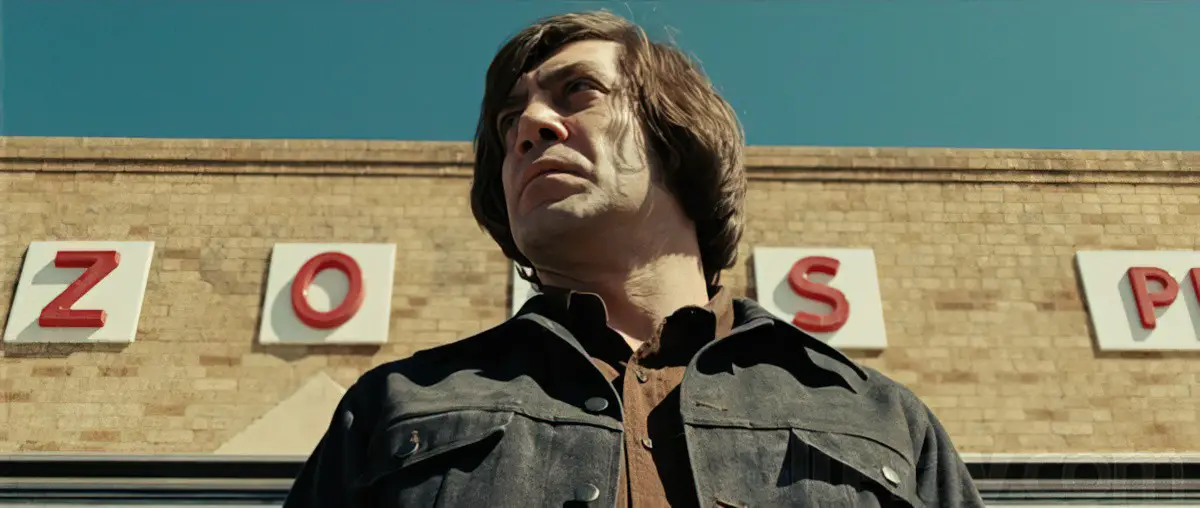
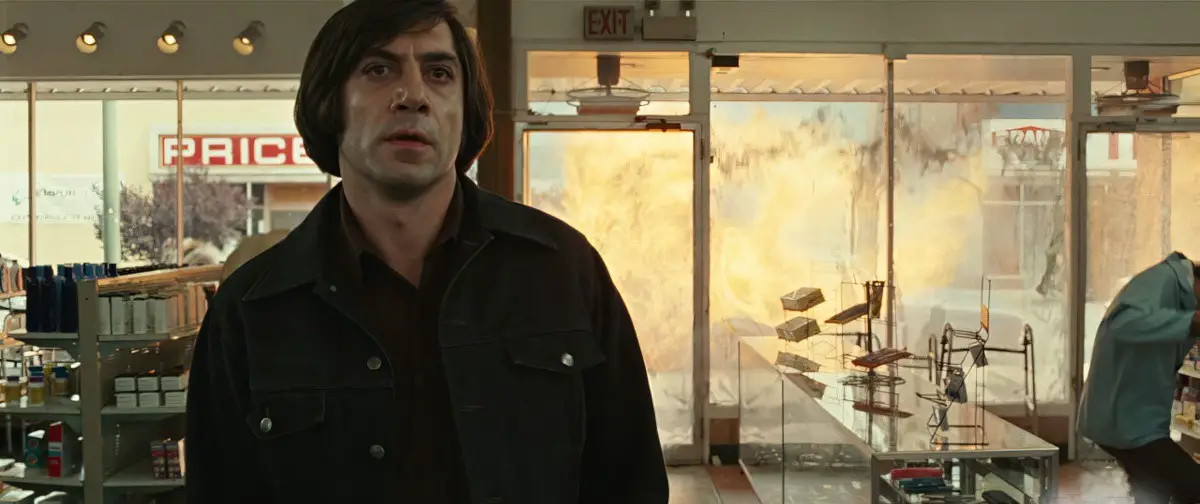
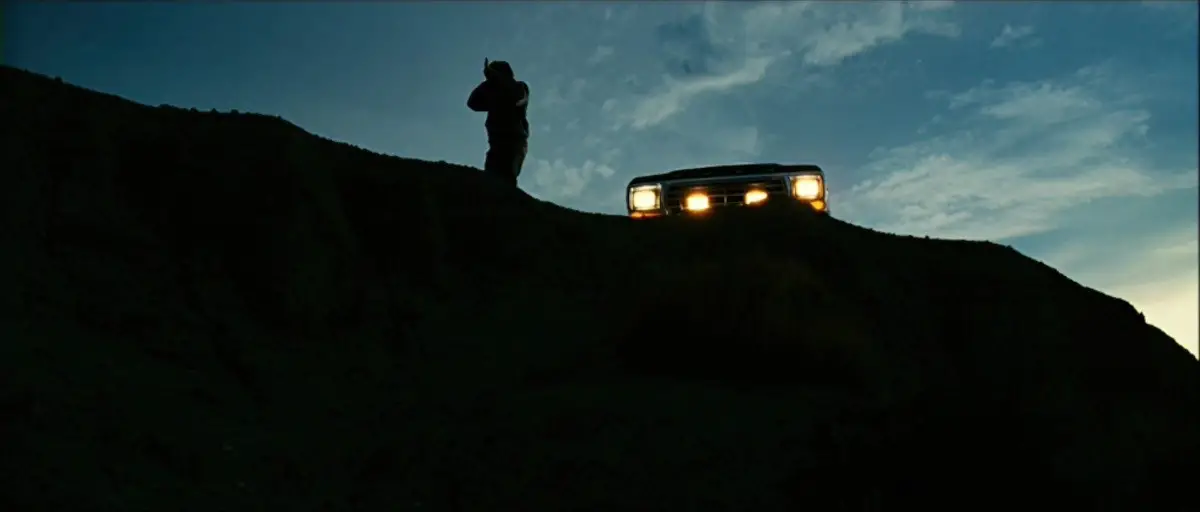
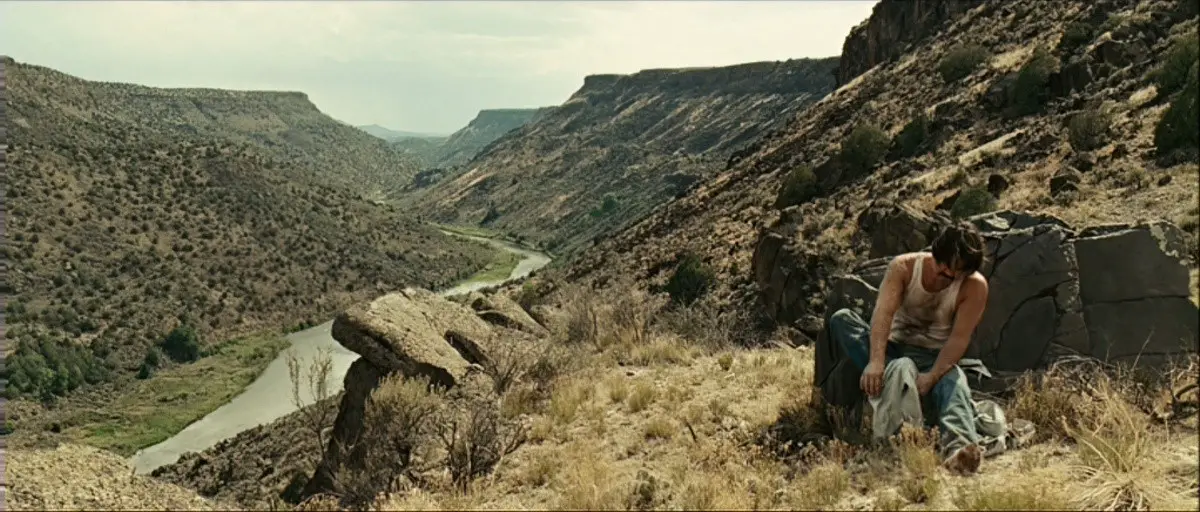
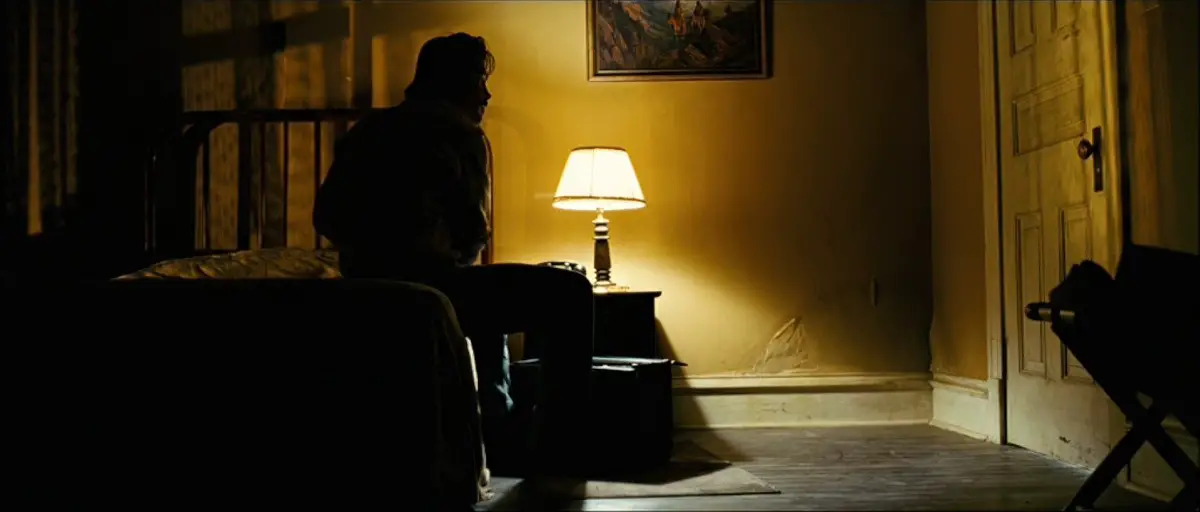
What makes this a ‘crime’ drama and not a ‘detective’ story? After all, the sheriff is doing detective work. Compared to detective stories, crime stories place less emphasis on detecting the criminal and more on the cat-and-mouse beats of catching them. In a crime story there is seldom any “mystery” as to who the criminal is. Typically the story starts with a brilliant or daring crime, and then a cat-and-mouse game of wits and will ensues, with the tension created by the increasing intensity of the battle between the opponents. The underlying question is: Will the cops prevail before the opponent stages their next crime?
No Country For Old Men is also an anti-western. Set on the frontier of USA and Mexico, this story is about the life and death big struggle that happens when you’re in the wilderness, with no one to rely upon but your own wits. It’s an anti-western because it does not glamorise the life and death big struggle, ending in a win. The point of an anti-western is to highlight the futility of expansion, not to glorify it. Llewellyn has struck his own jackpot in the form of two million dollars, in the same way that early white settlers thought they’d struck jackpot by finding a nice piece of land on the frontier, only to die of illness or injury, be challenged by Native Americans who were there first, or big struggled by the train company who wanted to take their land and use it for railroad.
No Country For Old Men is also an example of a neo-Western. This is a like a traditional western but set in the modern era. The setting isn’t necessarily The West, but somewhere reminiscent of that. It might even be set in space — typically it’s somewhere ‘godforsaken’, where you’re on your own.
SETTING OF NO COUNTRY FOR OLD MEN
When depicted in a single image, the film colours of No Country for Old Men don’t surprise me — a lot of yellowy ochre. I’m pretty sure the defective Kodak film issued in the 1970s has something to do with our link between ‘yellowed’ and ‘the 1970s’. (I’m a 1970s baby myself — all of my baby photos are yellowed.)
Dominant Culture
The title clues is into the fact that this is a story about masculinity. No Country For Old Men. Significantly, the main story is set in the year 1980, when feminism had not touched the trailer park subcultures of the USA/Mexico border in the Texas desert. This idea of hunter-and-protector backfires, but Llewellyn has soaked in it his whole life.
Place In History
In 1980 the Vietnam War was not long over. This wartime experience most definitely would have played a part in shaping Llewellyn’s sense of right and wrong, and because he came back with all his limbs intact, it would have also given him a false sense of his own infallibility.
In 1980 the USA was really starting to have trouble with drugs. Take for example the Miami drug cartel which lead to a series of massive shoot outs, one major incident the year before this story was set, in 1979. Incidents such as the fictionalised drug war in this story ultimately lead to the drug panic of the late 1980s, and mass incarceration for anyone involved in the most peripheral way with illegal drugs.
The storyteller is looking back from the mid 2000s (the book was published in 2005), and the reader knows where this fictional drug war fits within the wider drug war. The shoot out on the plains is itself a given — it is not the shootout itself that is story-worthy in this case. It is the cat-and-mouse chase.
Interestingly, the term ‘serial killer’ (not used in this film) was only coined in the 1970s, by a FBI criminal profiler called Robert Ressler. Until the 1970s, people didn’t realise serial killers existed. And if they did, they understood nothing of their psyche, because the research had not been done. Imagine that. Sheriff Ed is of that generation, let’s not forget. Even as a police officer and detective, this character would not have encountered serial killing as a concept until he encountered the character of Anton Chigurh.
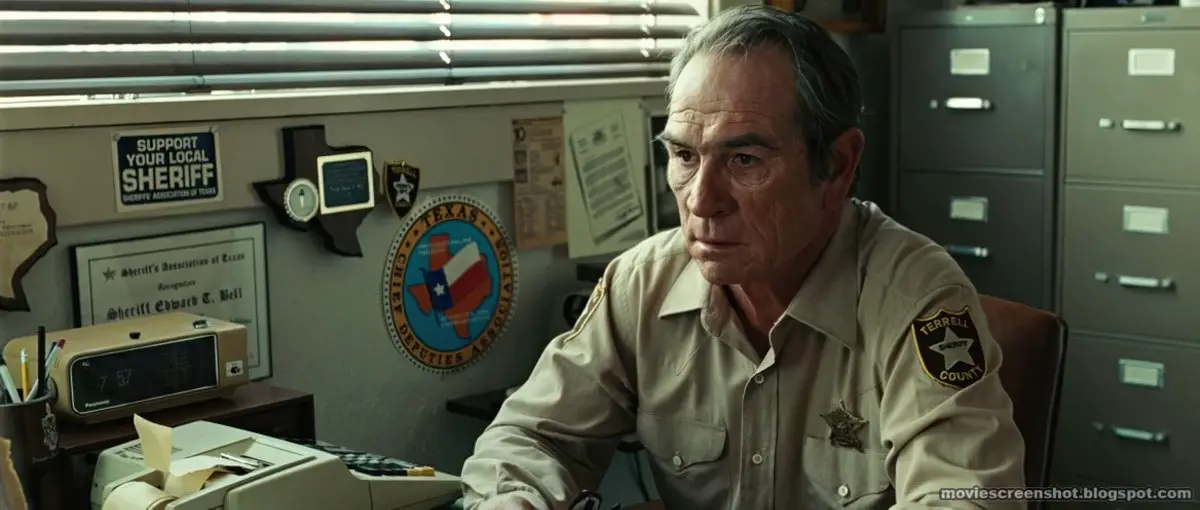
Technology
1980 is a great year to set a story like this because it’s before GPS and mobile phones. Technology is limited to the transponder — a piece of equipment a layperson such as Llewellyn would not have thought to look for. Lack of police technology is also what allows Anton to continue on a murder spree without being hunted down quickly.
Desert vs Trailer
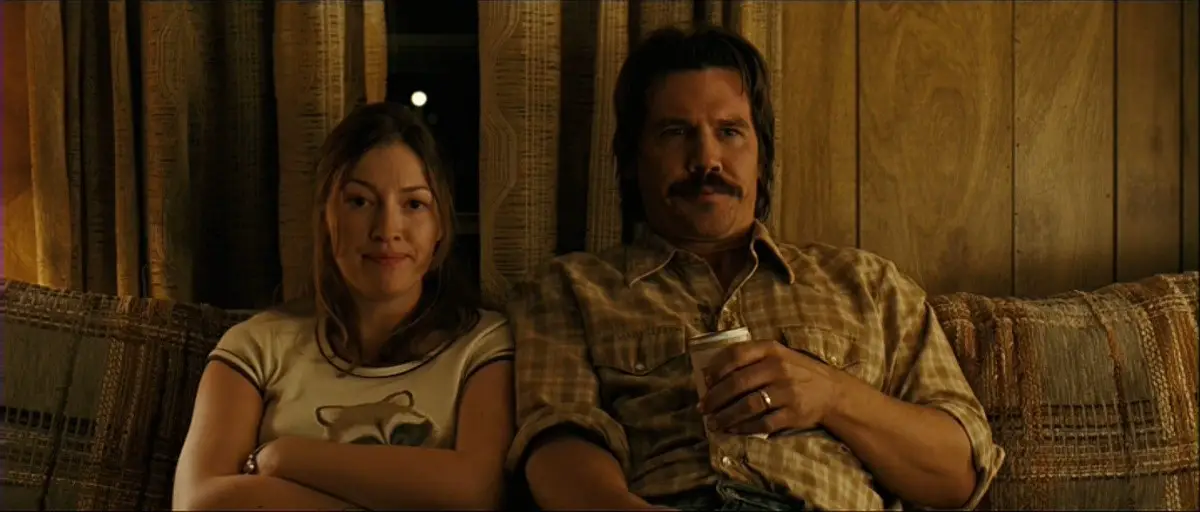
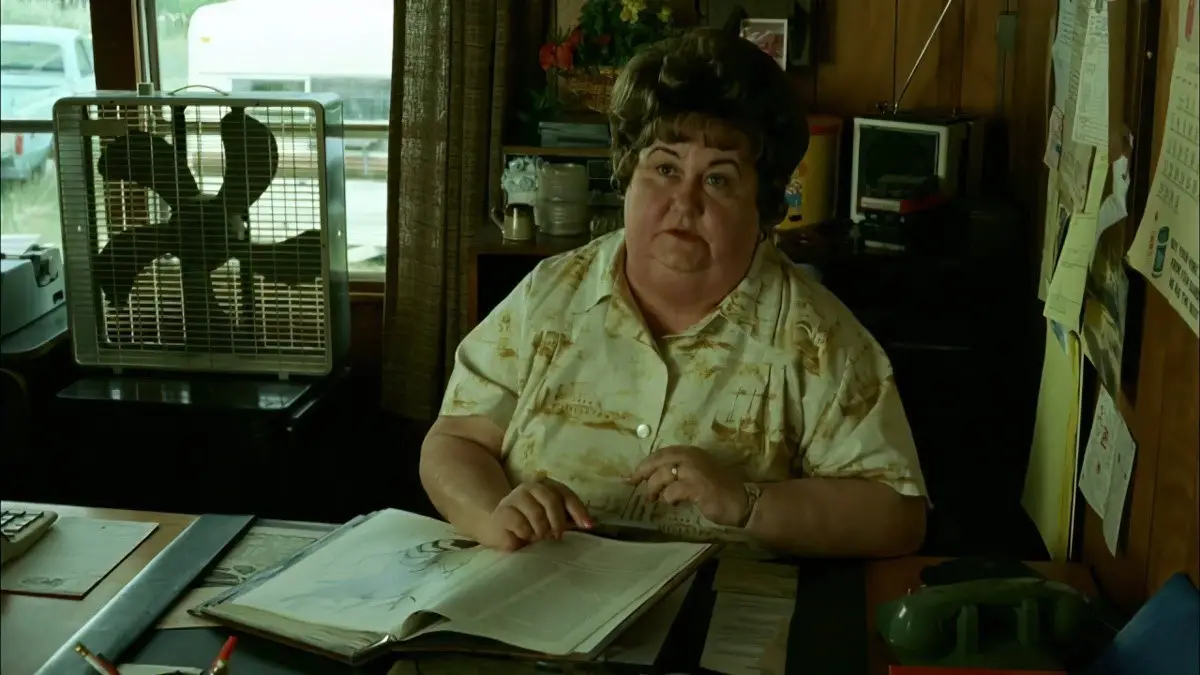
The vastness of the Texas desert makes for a strong opposition against Llewellyn’s cramped trailer home. Anton is part of the desert — a personification of abject wilderness — whereas Llewellyn is your stereotypical ‘trailer park white trash’, so he is symbolically linked to that. He has no freedom at all.
Symbolically, deserts are associated with death. (So are icy environments, which the Coen Brothers utilised to full effect in Fargo.)
Note that Anton is injured in an opulent leafy suburb. We see an opposition between rich and poor when Carson visits the leader of the drug cartel in that high rise office block (the one ‘missing’ a floor). We see it again with those middle-class boys on their BMXs, responding as only well-off boys can without personal sacrifice, “Hell Mister, I’ll give you my shirt!” Ironically, Anton is almost killed in a kind of paradise. Why should such an evil character die in paradise? Is that where he’ll end up? Who’s to say he wouldn’t? Maybe the rest of us have it all wrong about morality.
STORY STRUCTURE OF NO COUNTRY FOR OLD MEN
Who should we consider ‘the main character’ of No Country For Old Men?
Sheriff Ed is a storyteller narrator and the main character in the metadiegetic level of this story. Because Sheriff Ed was a part of the story himself, he is a homodiegetic narrator. But because he’s looking back on the story after some decades of reflection, he is also an extradiegetic narrator — no longer a part of the level zero story. Sheriff Ed is the main character of this level. It is the Sheriff storyteller who has the anagnorisis. Part of this revelation comes from the events themselves at the time, further revelations come in the decades following, and yet more come in the telling of it, to us.
That said, the ‘anagnorisis’ of Sheriff Ed is completely ironic. Why? Because he has no meaningful anagnorisis at all. The Sheriff has reached retirement and still cannot make head nor tail of how some people do the terrible things they do. When he tells us (his partner) at the breakfast table that he’s already lived twenty years longer than his own father ever did, we know that he’s as wise as he’s ever going to get, and the case of Anton Chigurh will never make any sense. The ‘revelation’ therefore, is that there will never be any revelation. Sometimes we can’t put a motivation behind evil.
The ‘level zero‘ story is, of course, the crime story in which Anton kills a lot of people in Sheriff Ed’s jurisdiction. In this level of story, who is ‘the main character’? We see about equal parts of Anton and Llewellyn. But because we do not identify with Chigurh at all — Chigurh is a wholly unsympathetic opponent — Llewellyn is more of a viewpoint character. But he’s not that either, because as I mentioned above, the audience constantly knows more about what’s going on than Llewellyn himself does. Instead, Llewellyn is the character we are encouraged to empathise with, and this is what makes him the star of the level zero story.
SHORTCOMING
Llewellyn is a heavily flawed character. We first see him shooting a deer. A lot of non-hunters will already be against him for that. Hunters on the other hand will see him look chagrined that he’s injured the deer but not killed it, and now he’s obliged to hunt it down and put it out of its misery. But then we see how he reacts to a human being in the same state as the deer — a Mexican about to die only asks for water. Driven by greed, Llewellyn is unmoved by his pleas. Like Chigurh, Llewellyn has his own moralistic world view. Since these guys were drug runners, they had what was coming to them. (The police later articulate the same view “Did of natural causes” as in “Natural to the line of work they was in”.) This asks the audience to draw our own moral line. To what extent are we sympathising with the victims when they were drug runners? What would we do in the same position? Ah, but what if we were dirt poor, like Llewellyn? Would we be more money motivated then? (We soon see him go back to his home. This is not a rich guy.)
However, there is soon a Save The Cat moment for Llewellyn. This was Blake Snyder’s term to describe a characterisation trick writers employ to engender empathy for a hero. Show them ‘saving a cat’. Whatever other evil they get up to, that’ll put the audience on side. “Ah, this character isn’t all bad,” we will say. And we are amazingly forgiving. Llewellyn’s Save The Cat moment is failing to sleep out of guilt for abandoning the dying Mexican who asked for agua. He gets up in the small hours and we see him filling a big bottle from the tap. We are further back on Llewellyn’s side when his act of kindness ironically ends up almost costing him his life.
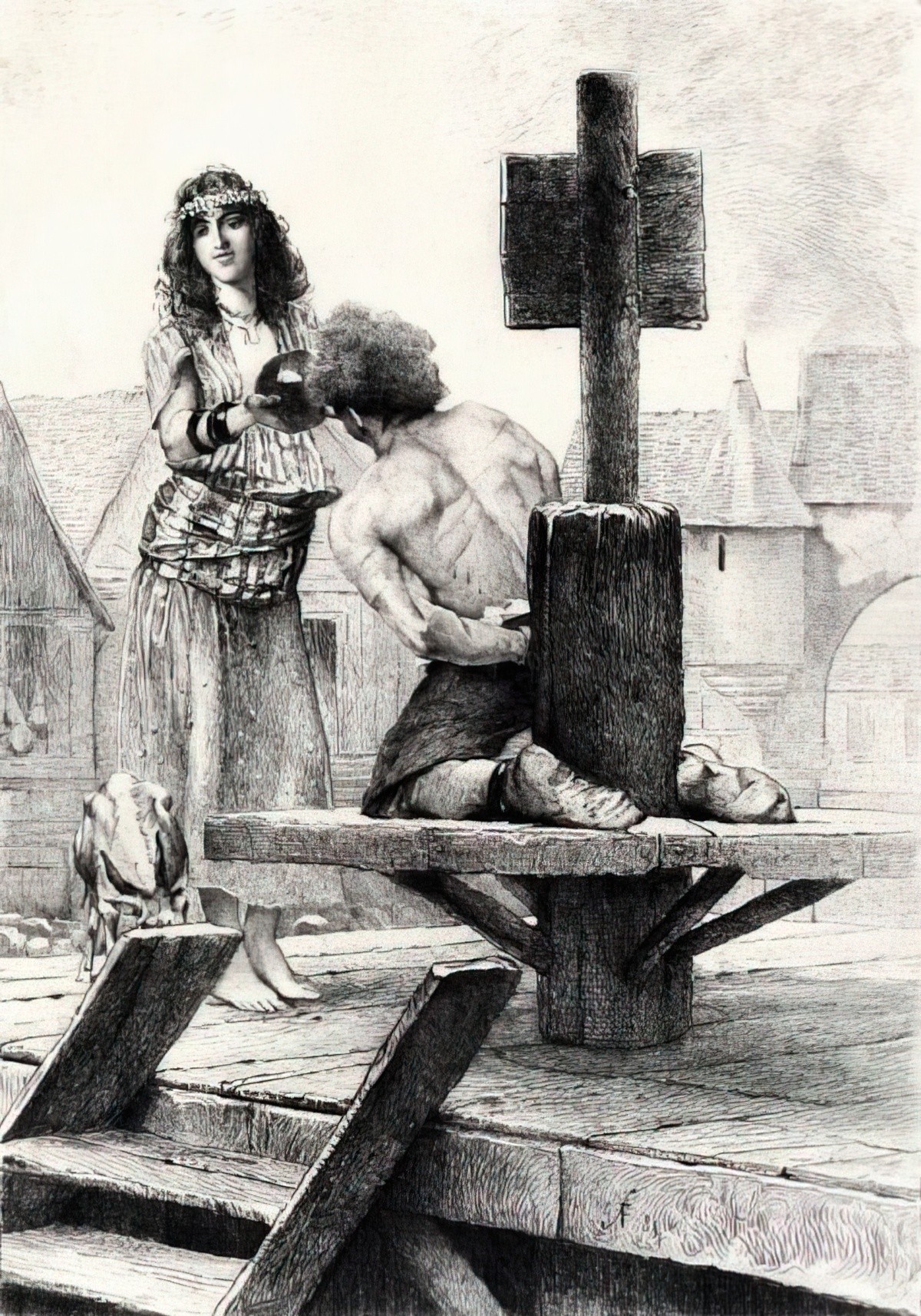
Llewellyn’s psychological shortcoming is that he can’t back down. We see that for ourselves, but this trait is underscored via dialogue between Norma Jean and Sherrif Ed. Norma Jean knows people well, is highly attune to her husband and is able to tell us that her husband thinks he’s some big shot and that he’ll never ask for help even if his life depended on it. Sure enough, this is what costs him his life, as well as many others’ lives along the way.
This particular psychological shortcoming has a definite Christian vibe to it. Christians are encouraged to submit to the healing powers of the Lord, to have faith and be constantly mindful of the fact that we are only human. We must consistently repent, try our best, fail then ask for forgiveness and do better. This is what gives this story a Christian feel, despite being atheistic and nihilistic in its message.
The nice thing about heavily flawed main characters: There are a few pitfalls writers aren’t going to fall into by accident. Here’s one of them, described by Dean Koontz:
If you choose to use a protagonist who is an admirable crook, do not fall into the moralistic trap of using the cliché ending in which, after all his trials and tribulations, the lead loses the stolen loot either through a quirk of fate, the machinations of an even more crooked partner, or the cunning of the police. If you have established your crook as a sympathetic character and have gotten your reader to root for him throughout the bank robbery (or whatever), your audience will only be frustrated when he loses everything simply because you feel that you must prove “crime doesn’t pay’.
Dean Koontz, from Writing Popular Fiction
When Llewellyn loses the loot, he kind of deserved it. We felt that from the start. Or perhaps we don’t feel the loss of the loot is significant because Llewellyn loses so much more than that.
DESIRE
The surface level desire is “I want two million dollars.” In this regard, the plot is similar to Hitchcock’s Psycho, because we never do find out for sure who ended up with this money. It is one of the most frequently-asked questions about this film on IMDb. The answer is that Chigurh probably ended up with it, not because we’re shown, but because we’ve been given enough about his character to know that’s what would have happened. (This in itself is a masterful case study in trusting the audience to ‘get’ a character — writers don’t have to keep beating us over the head with characterisation — audiences make assumptions pretty quickly when it comes to archetypes. A short story which achieves the same is “Je ne parle pas francais” by Katherine Mansfield.) As in the money stolen by Marion Crane in Psycho, the two million dollars therefore functions as what Hitchcock referred to as a McGuffin. This is the thing that starts the action, but by the end of the story we don’t care that much about what happened to the money — we care about who gets out alive.
What about Llewellyn’s deep down desire? The money functions only as a surface level desire. When Llewellyn tells Norma Jean that she is no longer employed by Walmart, that she is now a lady of leisure, this is a clue into his deeper psyche — he needs to be seen as the hunter and provider. It makes complete sense that we saw him first as a hunter. His sense of masculinity is so extreme that it is toxic. He needs to prove himself the big man, to himself, to his wife, and probably even to his mother-in-law, who has always said he is no good.
He also wants freedom. As we all do — this is a very easy desire for an audience to identify with. Here’s a guy who slaves away as a welder — a very versatile welder, by his description to Carson Wells — yet he lives with his wife in a trailer park. Between them they don’t seem to have enough money to bring kids into the world. (Not that this is mentioned.) I can imagine a man in that position feels he is owed this money. He fought for America, after all. Yet this is what he has when he gets back.
OPPONENT
Anton Chigurh is the Big Bad Monster of the story. We see quite a lot of him, but only in the same way Twister gives us shots of the tornado. Anton is a fascinating character, because humans have the need to watch sociopathic behaviours carefully. As an opponent he is interesting because he has his own morality. Carson Wells makes sure to remind the audience of that (talking to Llewellyn in the hospital bed) in case we missed it. Anton is an extreme version of a nihilistic fatalist. He justifies his actions, however heinous, with the belief that they had it coming to them, and that he, too, is part of an evil machination and can’t get out of it, because there’s no such thing as free will. Anton is a complete loner, so it’s very difficult to get such a character to have an ‘attack by ally’ moment in the way writers can do for their heroes.
But McCarthy masterfully wrote one in anyhow. Right before she’s killed, Carla Jean tells him that his decisions have nothing to do with a coin — that his decision to kill is completely up to him. Carla Jean can hardly be called an ‘ally’, but for that scene she is functioning as a friend/mentor, calling him on his bullshit. Of all the characters in this story, Norma Jean is the most brave. She pays the ultimate sacrifice for challenging Anton’s worldview. (We know she does because Anton checks his shoes — for blood — on the verandah outside. Anton has already been shown twice avoiding blood on his feet, first by taking off his white socks and flinging them into the bathroom of the Mexicans at the motel, and next by lifting his feet as the blood of Carson Wells pools below him.)
Anton Chigurh is set up as both similar and completely different to Llewellyn. The similarity is only superficial, as pointed out to Llewellyn by Sheriff Ed Tom Bell. Llewellyn thinks he’s Anton’s match. At first the audience probably wonders if Llewellyn will win out in the end. We’ve watched many, many stories in which the smaller guy — the underdog — ends up winning against evil. When Llewellyn walks into the hunting and camping store and tells the shopkeeper that white socks are the only kind he wears, the audience is shown that Chigurh, too, only wears white socks.
What motivates Anton? It’s exactly the same thing that motivates Llewellyn.
Really, how many different ways are there to kill someone? And how many different ways are there to kill someone? And how many different motives can there be? In the end it all comes down to money and sex. At most a writer can create an original variation on a tried-and-true theme.
Dana Stabenow
But it’s not even money and sex — it’s what these two things symbolise — power. Violent people have one thing in common — they need to be in control.
PLAN
Until he finds himself pursued by Anton Chigurh and co., Llewellyn’s plans are pretty simple. He and his wife are going to live off the proceeds forever, quitting their unpleasant jobs and probably buying a nice place of their own somewhere. But when the plot turns into a cat-and-mouse chase Llewellyn has to constantly modify his plans in order to evade death. Unfortunately, he’s not as smart as Anton and doesn’t have all the information. It takes too long to look for the transponder, and when he’s told about it he’s angry in response, saying yes yes, he knows all about that.
BIG STRUGGLE
As mentioned above, we’re shown so many big struggles that when it comes to the ultimate big struggle — the one where Llewellyn gets killed — we don’t get a scene, we get narrative summary. This is the opposite of what we’ve been led to expect from storytelling. Most stories ask us to revel in the big showdown after the big struggles get more and more intense. But we don’t even get to see Llewellyn die.
This is asking the audience to believe in fate. The story is training us to expect the worst, then it gives it to us, literally teaching us to become the pessimist that Sheriff Ed has himself become. In this way, even the big struggle scene is ironic — at a narrative level. We expect a big big struggle scene but don’t get one, defying story expectations.
This is why I reject the idea that this story is not ironic. It is ironic at every level, from dialogue down to plot structure.
The crime genre’s ur-story is explanation. Real life is arbitrary; bad things happen for no reason. Not so in the crime novel. There, justice may not be found but an answer is. Evil may not be controllable but there’s the solace of understanding.
Crime and Thriller Writing: A Writers’ and Artists’ Companion by Michelle Spring, Laurie R. King, which describes most crime stories, but not this one.
For another example of a big big struggle scene that takes place off screen, see Sicario, an action, crime, drama blend from 2015, which takes quite a bit from No Country For Old Men.
ANAGNORISIS
Sheriff Ed doesn’t understand these people and these events, and that’s the point.
Llewellyn never has any revelation either. He’s cavalier right to the end, showing interest in a woman beside the pool even though his life hangs in the balance.
Carla Jean is around a little longer, loses both her husband and her mother (to cancer) and everything she ever had, including her job, so at the end she is able to philosophise a little. She tries to help Anton Chigurh have a anagnorisis about self-determination but ultimately fails.
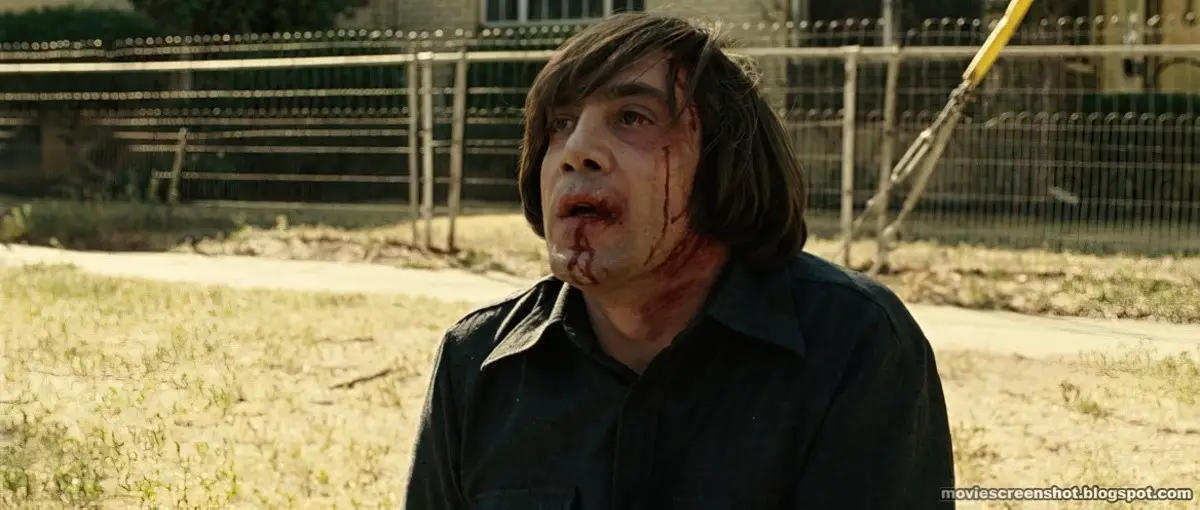
NEW SITUATION
Everyone in the level zero story is dead (probably even Chigurh himself, by the mid 2000s), leaving Sheriff Ed to try and enjoy his retirement, putting aside the misanthropy he has tried to run from in his own cat-and-mouse, purely psychological, failed escape from nihilism.
